Business
China hits back at US tariffs with vow to take case to the WTO
Published
2 months agoon
By
Ekwutos Blog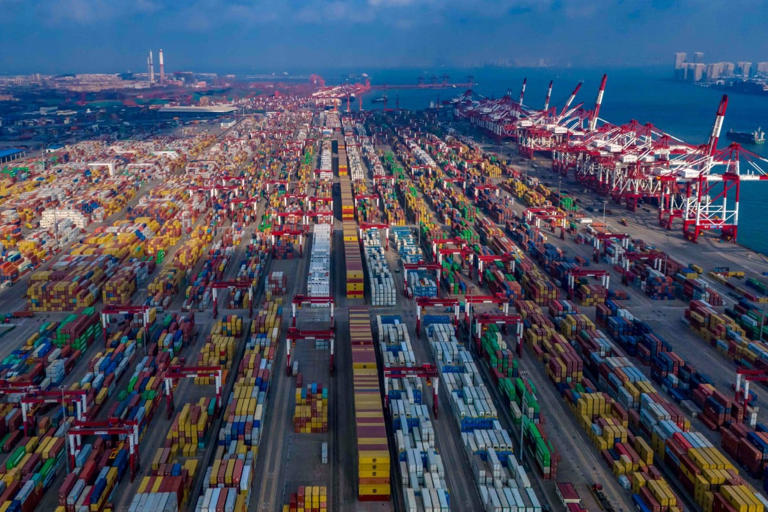
China will file a claim with the WTO and take necessary countermeasures to safeguard its interests, the Ministry of Commerce said on Sunday after the US announced it would impose tariffs on Chinese goods.
“The unilateral tariff hikes by the US seriously violate World Trade Organization rules,” the ministry said, adding that the move “not only fails to address America’s own issues” but also “disrupts normal China-US economic and trade cooperation”.
“We urge the US to take an objective and rational approach to its domestic issues, such as fentanyl, rather than resorting to tariff threats against other countries,” the ministry said.
Do you have questions about the biggest topics and trends from around the world? Get the answers with SCMP Knowledge, our new platform of curated content with explainers, FAQs, analyses and infographics brought to you by our award-winning team.
The ministry’s statement followed US President Donald Trump’s decision on Saturday to sign an executive order imposing a 10 per cent tariff on Chinese imports in response to what he said was the failure of Chinese officials to stem the flow of precursor chemicals for fentanyl into the United States.
Fentanyl is a powerful synthetic opioid that has led to hundreds of thousands of deaths in North America.
The White House also referred China’s “intellectual property theft, forced technology transfer, and other unreasonable behaviour”, as well as illegal immigration “including a rising number of Chinese nationals and people on the terror watch list”.
The Chinese Ministry of Foreign Affairs reaffirmed Beijing’s efforts to control the illegal production of fentanyl, saying the country was “one of the world’s strictest and most thorough enforcers of anti-narcotics policies”.
“The fentanyl crisis is a problem of the United States, and out of humanitarian concern, China has supported US efforts to tackle the issue,” the foreign ministry said.
It called the tariffs “unconstructive”, saying they would “inevitably impact and undermine” future cooperation between the two sides on drug control.
“We urge the US to correct its wrongful actions, safeguard the hard-won progress in bilateral anti-drug cooperation, and promote the stable, healthy, and sustainable development of China-US relations,” the foreign ministry said.
Along with the tariffs on Chinese imports, Trump also signed orders to impose a 25 per cent tariff on goods from Canada and Mexico. The tariffs will go into effect on Tuesday and will be on top of those already in place.
Gary Ng, a senior economist at French investment bank Natixis, said the executive orders marked a new trade war era, with the US “using tariffs to achieve US economic and geopolitical goals, regardless of whether they are (against) allies”.
“The move has brought the tariffs on the US’ biggest trading partners to a more similar level (as those on China),” Ng said.
He said China could take a range of retaliatory measures, including imposing reciprocal tariffs, introducing export controls on certain critical materials, and restricting market access for certain American firms.
Zhang Zhiwei, president and chief economist at Pinpoint Asset Management, said the 10 per cent tariffs signed off by Trump were “not a big shock to China’s economy”.
“It’s unlikely to change the market expectation of China’s macro outlook this year, which already factored in higher tariffs from the US,” Zhang said.
The tariffs on China are also well below the 60 per cent import duties Trump threatened to enact at various points on the presidential campaign trail last year.
Zhang added the focus of the US trade policy announced on the weekend was on Canada and Mexico, not China, pointing to the differing tariff rates imposed on each country.
More Articles from SCMP
Hong Kong football fans gather to see Rivaldo, Kaka and others for legends match
19-month-old boy in critical condition with flu at Hong Kong hospital
Missing Hong Kong man dies after being found unconscious at Suicide Cliff
Why celebrate Kowloon Walled City at Hong Kong airport?
Hong Kong’s Paul Chan warns Trump tariffs will prolong high interest rates
This article originally appeared on the South China Morning Post (www.scmp.com), the leading news media reporting on China and Asia.
You may like
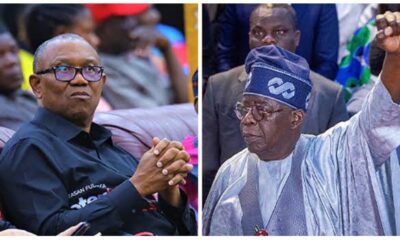

Peter Obi Criticizes President Tinubu’s Economic Management
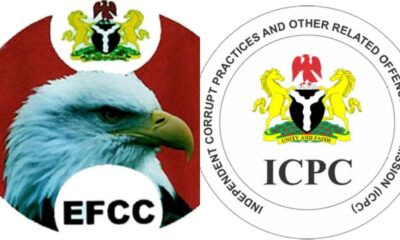

EFCC, ICPC asked to probe defence minister over alleged abuse of office


Gov Nwifuru arrests 6 commissioners, LG chairman over alleged breach of contract terms


Muslim leaders beg President Tinubu to review emergency rule in Rivers


Transfer: Leeds United line up move for Sanusi
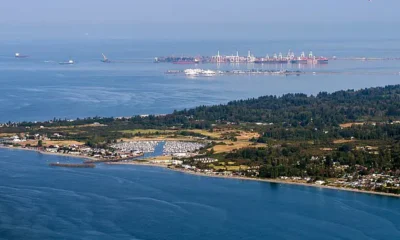

Locals in coastal exclave have to drive through Canada to reach US
Business
Why Aussie consumers could soon be paying DOUBLE for beef
Published
54 minutes agoon
April 2, 2025By
Ekwutos Blog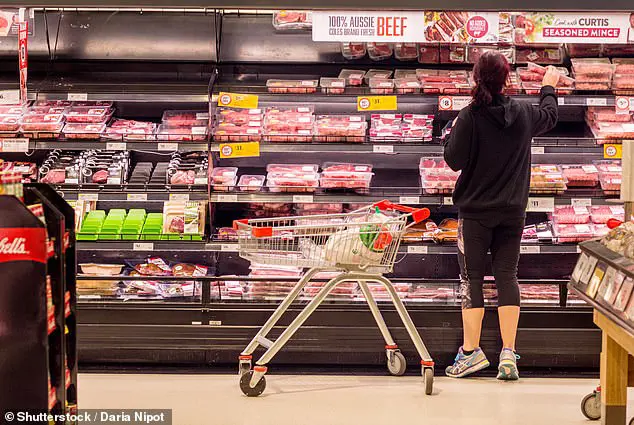
- Small-scale farmers warning of $56/kg rump steaks
- PODCAST: Trump round three, Musk’s breakup with DOGE – and former Denmark ambassador on the ‘smartest thing’ Greenland can do. Listen here
Australian consumers could end up paying more than $50 a kilo for steak at the supermarket as a result of Donald Trump‘s tariffs on agriculture exports, farmers say.
A kilogram of rump steak at Woolworths is now selling for $28.
But the Australian Food Sovereignty Alliance, representing 350 small-scale farmers, fears rump steak will end of costing Australian consumers $56 at the supermarket.
Spokeswoman Tammi Jonas, an organic beef cattle producer from Daylesford in Victoria, said the American tariffs on agricultural imports would see more countries buy Australian beef to avoid trading with the US.
‘We already know there’s high demand for Australian beef around the world and I think that’s just going to get higher,’ she told Daily Mail Australia.
‘In a global supply crunch like this, we could see rump steak climb past $50 per kilogram.
‘That’s not a family dinner – that’s a premium luxury.’
Dr Jonas said higher export prices would see less Australian meat sold to domestic consumers.
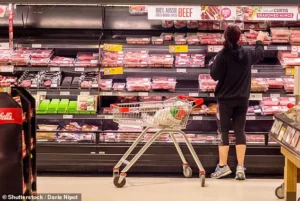
Australian consumers could end up paying more than $50 a kilo for steak as a result of Donald Trump ‘s tariffs on agriculture exports, farmers say (pictured is a Coles supermarket)
‘I would say there’s a strong likelihood of that, yes,’ she said.
‘And even if we still have enough beef sold within Australia, the prices are certain to go up.
‘Whenever you’re in those global markets, you roll with the volatility and if they can get a really high price overseas, they’re not going to charge less for domestic sales.’
But Angus Gidley-Baird, a senior analyst in animal protein with RaboResearch, said more expensive steak at the supermarket was unlikely, given the strong supply of Australian beef with the recent rainfall.
‘We produced record volumes of beef last year, I don’t see why there would be a shortage in the domestic market that would cause prices to rise,’ he told Daily Mail Australia.
‘The exports are effectively our markets that we sell the additional production into.’
Meat and Livestock Australia data showed the US was Australia’s biggest market for beef exports in 2024, putting it well ahead of Japan, South Korea and China.
Of the beef sent to the United States, 96 per cent of it was the leaner, grass fed variety that was either chilled or frozen.
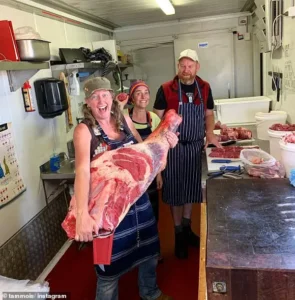
The Australian Food Sovereignty Alliance fears rump steak will end of costing Australian consumers $56 at the supermarket. Spokeswoman Tammi Jonas (left) said the American tariffs on agricultural imports would see more countries buy Australian beef to avoid trading with the US
The Americans have been in the grip of a drought, and most of their beef is fattier, grain-fed.
South American beef exporters Argentina and Brazil are also dealing with a lack of rainfall, which means demand for Australian beef would continue to be strong.
Mr Gidley-Baird said the Americans, who produced fattier, grain-fed beef, would still need the leaner, Australian grass-fed beef to make hamburger patties, regardless of import tariffs.
‘The US still continues to need imported product because they’re not producing as much themselves,’ he said.
‘They’ll still need Australian beef – the drought, it’s getting better in the US but they’ve liquidated their herd and production volumes are down.
‘What Australia sends to the US complements their production system over there in that it balances out the fatter product they’re producing for hamburger production.
‘They need the product and we’re one of the biggest suppliers of it – me being rational would still say that they would still buy it.’
At the margins, strong American demand for grass-fed beef had pushed up prices for Australian lean mince, now selling for $15.50 a kilo at Woolworths.
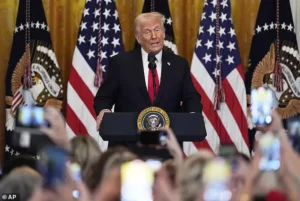
The Trump Administration’s tariffs of up to 25 per cent on agricultural imports are coming into affect on Thursday, along with tariffs on pharmaceutical products (President Donald Trump is pictured in the White House)
‘The US market has been very strong – it’s demanding a fair amount of product which is putting a bit of pressure on mince prices, lean product prices,’ Mr Gidley-Baird said.
The Australian Food Sovereignty Alliance sees mince prices more than doubling to $36 a kilo.
But Dr Jonas predicted possible tariffs of up to 25 per cent on Australian beef would see American demand plunge, despite the fact they are in drought with an undersupply of grass-fed beef.
‘I think with a 25 per cent tariff they won’t be able to afford it – Americans are in as big a cost-of-living crisis as Australians are and they can’t handle a 25 per cent tariff on top of the higher meat price of imported Australian beef,’ she said.
The Australian Food Sovereignty Alliance didn’t do specific economic modelling on Australian beef prices, as a result of the Trump tariffs on agriculture coming into effect on Thursday.
But it argued China’s African swine flu in 2019 led to a doubling of pork prices, as supply fell by 40 per cent.
The alliance campaigns against agribusiness giants like JBS Foods Australia, which owns feedlots and abattoirs.
‘The local farmers like us are losing access to the facilities to slaughter,’ Dr Jonas said.
‘While that sounds like a good thing for Australia – when we think, “We can export more” – the reality of that is very few people profit from that higher export.’
The Trump Administration’s tariffs of up to 25 per cent on agricultural imports are coming into effect on Thursday, along with tariffs on pharmaceutical products.
‘If it’s a large tariff but applied to everyone, our competitive position remains the same,’ Mr Gidley-Baird said.
They follow 25 per cent tariffs on steel and aluminium, introduced on March 12.
Business
BREAKING: Tinubu sacks NNPCL CEO, Mele Kyari, appoints Bayo Ojulari
Published
6 hours agoon
April 2, 2025By
Ekwutos Blog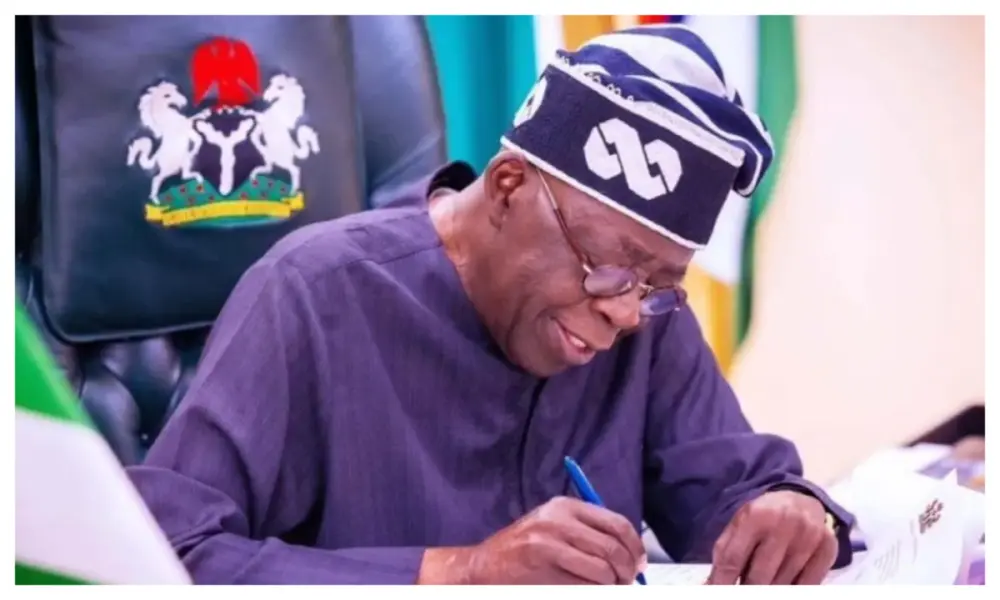
President Bola Tinubu has sacked the Group Chief Executive Officer (CEO) of the Nigerian National Petroleum Company Limited, NNPCL, Mele Kyari.
Tinubu also dissolved its board, removing the Chairman, Chief Pius Akinyelure.
Bayo Onanuga, Special Adviser to the President on information and strategy, announced this in a statement on Wednesday.
Onanuga said Tinubu invoked his powers under section 59(2) of the Petroleum Industry Act (PIA) 2021 to carry out the sweeping reconstitution, citing the need for “enhanced operational efficiency, restored investor confidence, and a more commercially viable NNPC”.
He announced that Tinubu has now approved a new 11-man board, which has Engineer Bashir Bayo Ojulari as the Group CEO and Ahmadu Musa Kida as non-executive chairman.
According to the statement, “Adedapo Segun, who replaced Umaru Isa Ajiya as the chief financial officer last November, has been appointed to the new board by President Tinubu.
“Six board members, non-executive directors, represent the country’s geopolitical zones. They are Bello Rabiu, North West, Yusuf Usman, North East, and Babs Omotowa, a former managing director of the Nigerian Liquified Natural Gas( NLNG), who represents North Central.
“President Tinubu appointed Austin Avuru as a non-executive director from the South-South, David Ige as a Non-executive director from the South West, and Henry Obih as a non-executive director from the South East.
“Mrs Lydia Shehu Jafiya, permanent secretary of the Federal Ministry of Finance, will represent the ministry on the new board, while Aminu Said Ahmed will represent the Ministry of Petroleum Resources”.
He added said that all the appointments are effective today, April 2.
Business
Aliko Dangote, Femi Otedola, Mike Adenuga, and Abdulsamad Rabiu have been named in the 2025 Forbes billionaires list, released on Saturday, March 29.
Published
3 days agoon
March 30, 2025By
Ekwutos Blog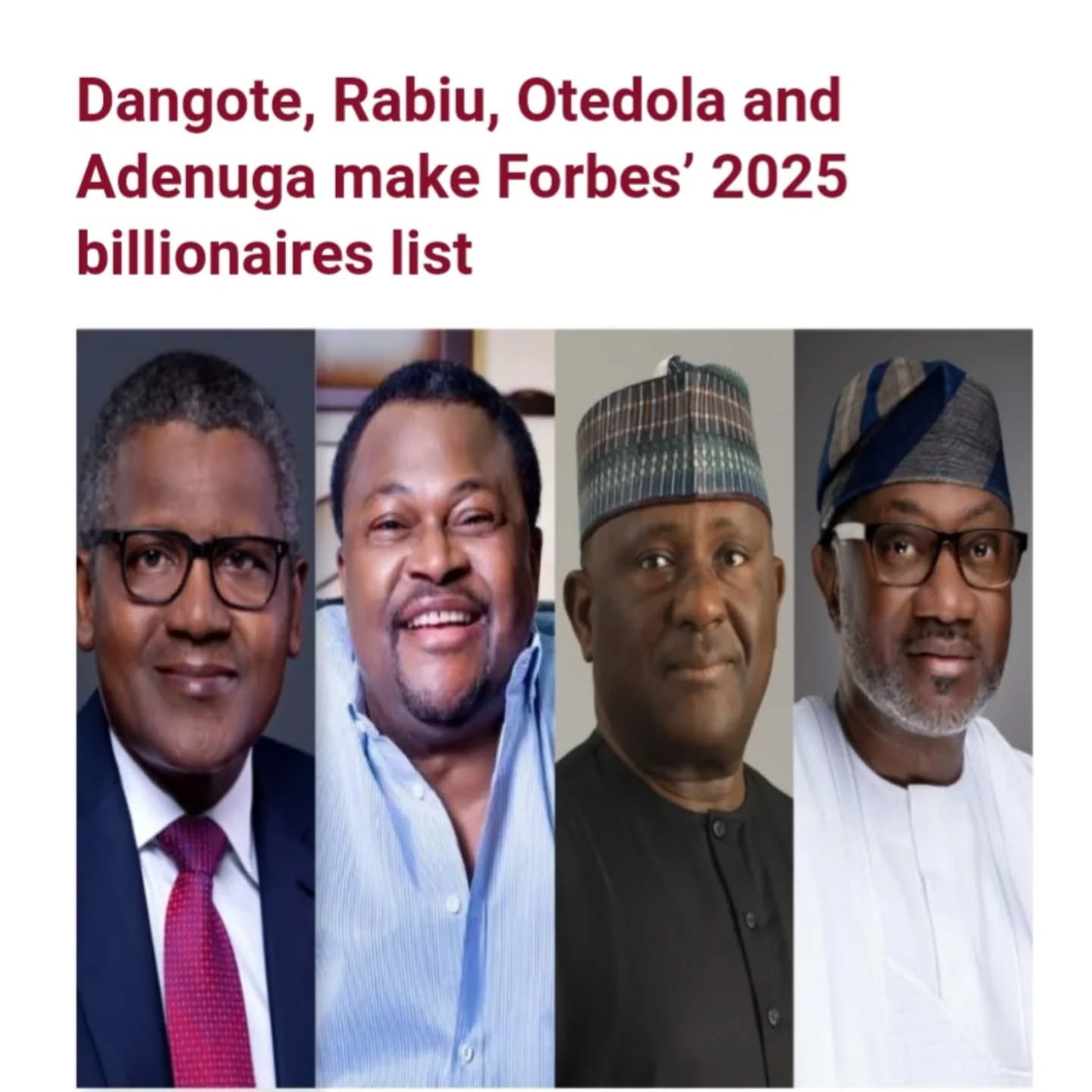
The four businessmen are the only Nigerians to feature on the prestigious lineup, with Dangote leading the continent’s wealthiest individuals.
Dangote, the owner of Dangote Refinery, has seen a significant increase in his net worth, rising from $13.9 billion in 2024 to $23.9 billion, securing his position as Africa’s richest person for the 14th consecutive year. “Aliko Dangote of Nigeria tops the list for the 14th year in a row with an estimated net worth of $23.9 billion, up from $13.9 billion a year ago,” Forbes stated. “The big jump in his fortune is primarily due to Forbes adding the value of his refinery, which opened last year on the outskirts of Lagos after long delays.”
Adenuga, chairman of Globacom, was ranked as the fifth richest African with a net worth of $6.8 billion, while Rabiu of BUA Group followed in sixth place with an estimated $5.1 billion. Otedola, chairman of First Bank of Nigeria (FBN) Holdings Plc, was listed in joint 16th place with a net worth of $1.5 billion.
Forbes highlighted Otedola’s growing fortune, stating, “Another billionaire whose fortune grew more than 30%: Femi Otedola of Nigeria (No. 18, $1.5 billion), chairman of listed power generation firm Geregu Power Plc. Shares of Geregu surged some 40% in the past year following a jump in revenue and profits. Two African billionaires who made the list in the past and then fell off are back on again.”
The report further revealed that South Africa led the continent with the highest number of billionaires, boasting seven individuals on the list, followed by Nigeria and Egypt with four each. Morocco had three billionaires, while Algeria, Tanzania, and Zimbabwe each had one.
Forbes described 2025 as a historic year for Africa’s wealthiest individuals, with the cumulative wealth of the continent’s billionaires surpassing $100 billion for the first time. “Africa’s 22 billionaires saw their fortunes rise to a total of $105 billion, up from $82.4 billion and 20 billionaires last year. It’s no small feat to generate this”…

They’re disloyal, playing with lives of American people – Trump slams four US senators

PRESIDENT TINUBU TO EMBARK ON WORKING VISIT TO PARIS

Barca never had financial room to register Olmo – La Liga
Trending

 Trending5 months ago
Trending5 months agoNYA demands release of ‘abducted’ Imo chairman, preaches good governance
- Business5 months ago
US court acquits Air Peace boss, slams Mayfield $4000 fine

 Politics5 months ago
Politics5 months agoMexico’s new president causes concern just weeks before the US elections
- Entertainment5 months ago
Bobrisky transferred from Immigration to FCID, spends night behind bars
- Entertainment5 months ago
Bobrisky falls ill in police custody, rushed to hospital

 Politics5 months ago
Politics5 months agoRussia bans imports of agro-products from Kazakhstan after refusal to join BRICS

 Politics5 months ago
Politics5 months agoPutin invites 20 world leaders
- Politics1 year ago
Nigerian Senate passes Bill seeking the establishment of the South East Development Commission.

